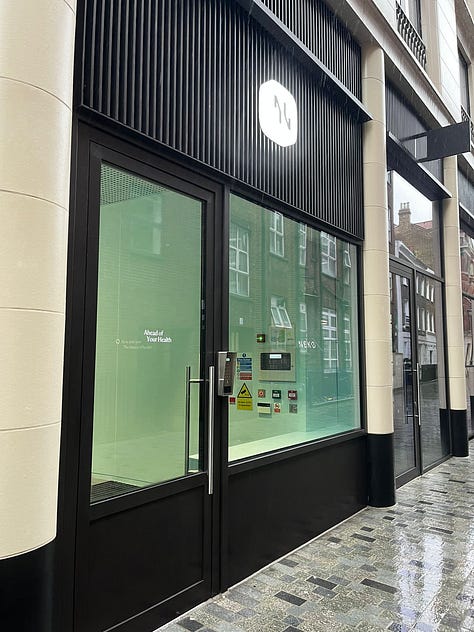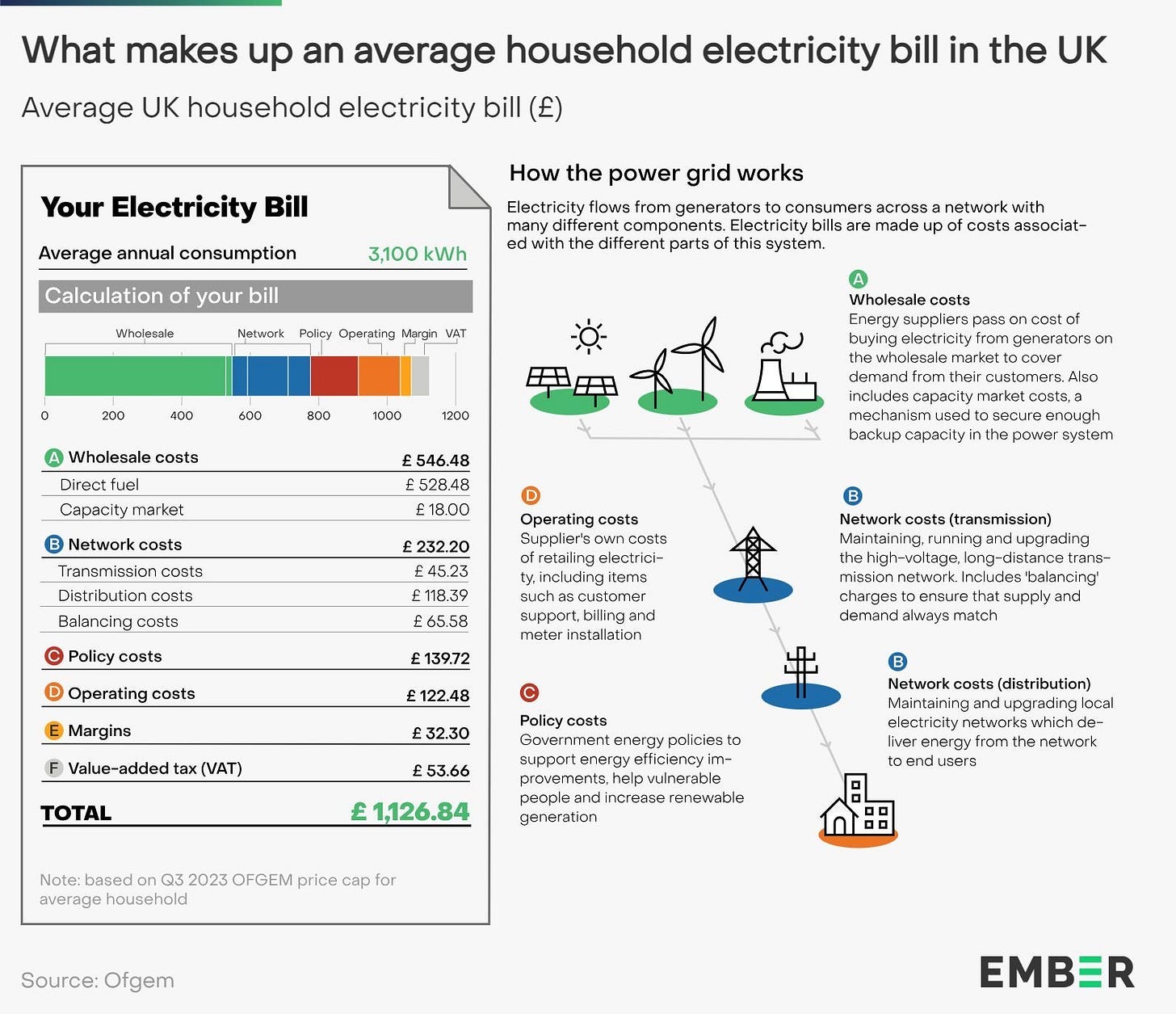The primary care clinic of the future: earlier treatment at lower cost 🗞️
At Eka, we believe that early diagnosis enables better health outcomes.
By detecting disease sooner, we can intervene earlier, often at a lower cost and with improved chances of successful treatment. This principle is at the heart of our consumer health investment thesis.
In recent years, we've seen a wave of innovative companies bringing diagnostic solutions directly to consumers. Over the coming weeks, we’ll take a look at three examples:
*We’ll be covering our Neko Health experience in this article, with Daye and Oxcan to come in later editions.
Neko Health: A Better Health Check (Part 1)
Founded in 2018, Neko Health offers a preventative health screen. They have just opened their first London clinic which is why there’s been a special buzz in the last few days.
Neko’s screen sells itself on two features: (1) cardiovascular and (2) skin health, but there are many more bells and whistles including eye pressure tests, grip strength, and tissue composition analysis. By making these advanced screening tools available to consumers, Neko is working to democratize access to life-saving early detection.
The founder line-up is impressive. They include Spotify co-founder Daniel Ek & entrepreneur Hjalmar Nilsonne who had previously built Watty in Sweden.
The vision was simple.
“Our initial product vision was: imagine downloading all your health data in under a minute, at virtually no cost. While we're not quite there yet, we've made significant strides.
Today, in under 15 minutes, we can capture 15 GB of high-quality health data from a single scan, all at a minimal cost. This progress brings us closer to making preventive healthcare a reality for everyone.” - (Neko Health Website)
The company raised a €60m Series A last year from Atomico, Lakestar, and General Catalyst to fuel the UK expansion and consumer reach in Sweden.
After months of waiting, our expectations were high going into Neko.
We were pretty excited when the UK wait list opened up a few months ago. The Eka team signed up early on and waited patiently until…

… last Tuesday night when we got a foretelling of what would come the following morning.
On cue, after waiting for >30m for our text confirmation codes, we signed up and received one of the first slots for the London scan. Win!
For these waitlisters, a Neko scan set you back £299 (to be discussed later…).
Before the scan, I wrote a few hypotheses down (and questions I wanted to ask the clinicians) to frame the session. Screenshot below.
The experience was surreal from the tech, design, and clinician interactions.
The entrance to Neko Health is understated. Don’t let this fool you.
The clinic is tucked away in a quiet Marylebone street, just an 8 minute walk from Harley Street. For non-London folk, this is the prestigious private healthcare capital of Central London.



I was excited to experience the design, look, and feel of the place after learning that the space had been designed by a multi-media designer Alfredo Aponte.
An initial clinician greeted me, I took off my shoes and ventured into a changing room which you can see on the right hand side. I had been planning to take photos inside but the staff ask you to remove all items (watches, jewelry, phones).
The ‘data gathering’ takes 30-40m, followed by a 20-30m consultation with a clinician who reviews the data live with you.
As a side note, you can decide whether you want the session AI recorded & transcribed. I’ve opted in but haven’t received a proper transcript, but instead got a summary. This looks to have been reviewed and checked by the GP who spoke to me live. This summary is part of a bigger follow up (next section).
In the data-gathering phase, the team tested the following:
I know the overall building design isn’t the point of the experience, but I think it kind of is the point in that the consumerisation is clear from the lighting to the sounds played throughout the consultation. I particularly liked Alfredo’s instagram below…
The follow-up covers the key data points from the scan… but the true value will sit in the longitudinal data.
The follow-up is accessible through the Neko app and covers:
Summary written note of your appointment, including key takeaways (e.g. your blood work suggested X, your skin markings suggested Y, we will write you a referral letter for Z to your GP).
High level scan data (middle image below) covering all the key health sections.
Detailed view of each metric including why it’s collected, what high/low results mean, and what the trend tells me.



This ‘trend’ piece is what I’m really excited about. At the end of the in-person consultation, you have the ability to book your following Neko scan for a slightly reduced price in a year’s time.
I’ve already booked myself back in for September 2025. Apparently 3 in 4 patients going through Neko do the same.
Common pushbacks to preventative care
There are two important pushbacks we hear about this approach.
By mass-screening people, we will find many problems which deserve attention and will overflow into the care system. In other words, a lot more people will seek treatment which will be expensive. This creates some health anxiety for little reason.
The price point isn’t accessible. Paying £299 for each screen isn’t yet affordable for the mass market.
On (1), this might be a tail risk but the early Neko data suggests that this is small today. Their post “Year One” goes through the early outcome data from 2,700 people who they scanned in 2023.
“For 78.5% of people scanned, our examinations showed no health issues or need for further examination…
…14.1% of the people who underwent a Neko Body scan needed medical treatment and monitoring…
…1% of all people that we scanned received a potentially life-saving intervention…
…6.6% of the people scanned had a moderate to severe health condition…
…2.1% of the people showed early signs of health issues such as elevated blood pressure, increased blood sugar levels, abnormal heart rhythms, or pre-cancerous skin conditions.”
It’s pretty incredible that c.27 people received a life-saving intervention. None of these people were aware of their condition prior to the visit*.
The health anxiety argument rests though on the remaining 99% who probably have some sub-optimal cholesterol which needs addressing through lifestyle interventions.
If the pathways post Neko are set up well, then I don’t think this is as important as we claim it to be. For example, there could be digital and non-digital aids about lifestyle interventions which help lower cholesterol. I’m a believer that seeing the health data creates a bias for action, rather than being totally disengaged with your health.
On (2), it’s true that this is expensive and out of range for a lot of people.
Health equity is another tenant of our consumer health thesis, and Neko isn’t there yet. There will need to be 1) price reductions and/or pricing tiers if consumers continue to pay out of pocket, and/or 2) different payment methods including state and insurers.
We would encourage a broader debate on ROI (return on investment) as Neko proves out the health economics of preventative care (looking at you insurers & NHS!).
I’m sure that some of this is already happening behind the scenes.
Taking a step back: the consumerization of health
The diagnostics space is a good example of the Consumerisation of Health.
For many conditions, the current system struggles to provide timely, personalized care. Products from companies like Daye, Neko, and OxCan empower consumers to take a more active role in managing their own health.
However, affordability remains a key hurdle. We’ll explore this in later editions, but believe that this is V1 of pricing in consumer health.
Enabling consumers to take control of their health is core to our thesis. By putting clinically-proven diagnostics in the hands of individuals, in an engaging way, we can:
enable earlier treatment,
better health outcomes & equity,
and a more efficient healthcare system for all.
Don’t be shy, reach out if you’re building in this space at estia@ekavc.com.
*Note - we previously mentioned false positives in the Neko data, but an astute reader pointed out more detailed data which corrected for false positives, so we have taken this comment out.
Week in Impact Articles ✍🏽
Monday: The jet stream may be starting to shift in response to climate change
Tuesday: Volvo drops pledge for 100% electric car sales by 2030
Wednesday: AI and the Labor Market: Will Firms Hire, Fire, or Retrain?
Thursday: Rise in corporate climate targets continues, but credibility concerns persist
Friday: 📖 Venture Chronicles - August 2024
3 Key Charts 📊
1. Ambient AI’s scribe showing good uptake in its panel study.
2. Are Europeans less productive than Americans?
3. What’s in an electricity wallet…
Eka Portfolio News 🎉
Congratulations to Flok Health for this awesome article in The Telegraph!
Review of the Week 🗣️
Getting in Touch 👋.
If you’re looking for funding, you can get in touch here.
Don’t be shy, get in touch on LinkedIn or on our Website 🎉.
We are open to feedback: let us know what more you’d like to hear about 💪.













Super interesting, thank you for writing this! I admire them so much for pushing healthcare into the future. However I read their data in a different way. 14.1% of people needed treatment/monitoring, 9.7% had severe/moderate/early-signs, which leaves 4.4% (119 people) who appeared to need treatment/monitoring, but actually didn't. Maybe I've misunderstood though - point being, it'd be great if they published & discussed the false positives!